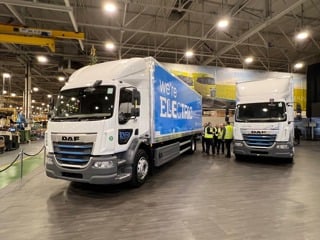Sitting opposite Dermot Coughlan in his first floor office, it’s immediately clear that you’re at the heart of a business where delivering results come first and foremost.
Don’t think Spartan, minimalist design or clean lines and state-of-the-art coffee machines; imagine instead, honesty, hard work, drive and desire.
A line of trophies stand proudly alongside a collection of files and folders, while a single window gives a view of the busy yard. It bears the scars of a working day, of managing risk and cost control, and making sure Kelly Communications Plant stays ahead of the game through robust policies to manage its fleet proactively.
In tackling risk, its policies are initiated before it even purchases a vehicle or employs an individual that will be required to drive.
By servicing and maintaining its vehicles to a high standard, it also ensures its vans are fit for purpose, reducing breakdowns and providing the safest possible working environment for its drivers.
“It doesn’t have to be difficult,” says Coughlan. “Get the correct policies and procedures in place, and then ensure your drivers understand what’s expected of them.”
As operations director, he is responsible for managing the company’s solus Ford fleet of around 850 vans and 100-plus cars.
He played a pivotal role in the company winning the Fleet News Fleet of the Year Award for 501-1,000 vehicles.
Fleet News: What measures are you employing to manage risk?
Dermot Coughlan: Prior to potential candidates being accepted to our training school they will undertake a driving assessment, as well as the normal interview.
Should they fail the driving assessment they will not be employed. Each driver is then given a risk profile of either ‘green’, ‘amber’ or ‘red’, using criteria such as age, length of service, driving assessment result and driving history.
Drivers also have to sign up to the Kelly Group Safe Driving Agreement, a pledge to drive responsibly and safely.
It’s extremely important that when they get behind the wheel of a van they understand they’re an ambassador for the company.
We have three full-time, IAM trained assessors and they help our drivers understand that they have two roles within the business.
In a house, they’re an engineer, but when they get into a van they’re a professional driver.
They have two jobs and the two cannot overlap, because if a driver is worrying about the next job they’ve got to get to, they’re not concentrating on the job in hand.
We carry out training with every driver, targeting their areas for improvement and depending on their profile group they are reassessed every three, six or 12 months.
We also issue toolbox briefings on a monthly basis, covering one fleet-related subject, such as reversing or tyres, and one health and safety matter, such as fatigue.
In addition, our fleet risk management forum meets every four to six weeks to review all drivers, accidents and policies.
It’s a combination of these measures that have helped us cut the number of accidents our vehicles are involved in by half during the past five years.
If a vehicle is involved in a collision all claims are handled in-house. Drivers must call our 24-hour hotline from the scene to enable our claims team to help manage the situation.
We manage the claim until the file is closed, dealing with accident investigations, disciplinaries and damage.






















Login to comment
Comments
No comments have been made yet.